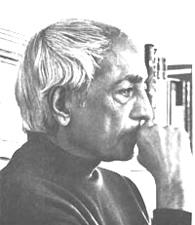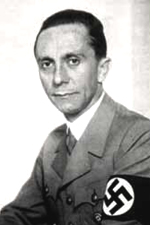Sathyam Commentary
31 May1998
Truth and Propaganda
  
"..Where propaganda
'does not have anything to do with truth', that which
you propagate may lose credibility and you may cease
to influence. Where you seek blind support, you may end
only with blind supporters. The so called pragmatic
approach may lead to a sliding slippery slope of
opportunism, without knowing when and how to stop. You
may then fail to mobilise the reasoned support that
you need to achieve your goal - even though the goal
that you seek may be patently just. The result may be
an increasing cynicism, a lack of coherence and, in
the end, a failure to secure the very 'victory' which
was so eagerly sought. It is only when word and deed
coincide, that principle emerges with power to bring
about change. We serve 'victory' by serving truth - and
not the other way around."
Some 70 years ago, Jiddu Krishnamurthy declared
that truth was a pathless land. But to Hitler's
propaganda chief, Joseph
Goebbels, truth had a rather more directed content.
He said in the 1930s:
"We serve truth by serving a German
victory. Propaganda does not have anything to do with
truth..."
Those who subscribe to the Goebbelsian
view, say with a disarming 'realism' that that, after
all, is the way it is. Get real, they say. In a war, we
cannot afford the luxury of speaking the truth at all
times. An armed conflict is no afternoon tea party, they
say. We serve truth by serving the victory of 'our side'.
But, perhaps, the fate eventually suffered by both Hitler
and Goebbels may also point to a lesson that we may
usefully absorb.
Where propaganda 'does not have anything
to do with truth', that which you propagate may lose
credibility and you may cease to influence. Where you
seek blind support, you may end only with blind
supporters. The so called pragmatic approach may lead to
a sliding slippery slope of opportunism, without knowing
when and how to stop.
You may then fail to mobilise the
reasoned support that you need to achieve your goal -
even though the goal that you seek may be patently just. The
result may be an increasing cynicism and a lack of
coherence and in the end a failure to secure the very
'victory' which was so eagerly sought. A thousand flowers
may have bloomed but each may have strangled the growth
of the other.
The truth is that we serve 'victory' by
serving truth - and not the other way around. It is only
when word and deed coincide, that principle emerges with
power to bring about change. The cyanide capsule in the
hands of the Liberation
Tigers of Tamil Eelam is evidence not of a simple
minded willingness to die but of a fierce determination
that cries out: ''I will not lose my freedom except with
my life.'' It is this thiyagam, this willingness to
suffer, this coincidence of word and deed, this truth
that has found an answering response from millions of
Tamils living in many lands.
At the same time, the words of Albert
Camus in The Rebel remain a caution:
"...From the earliest days, they were incapable of
justifying what they nevertheless found necessary, and
conceived the idea of offering themselves as a
justification and of replying by personal sacrifice to
the question they asked themselves. For them as for all
rebels before them, murder is identified with
suicide... therefore they do not value any idea above
human life, though they kill for the sake of ideas.
To be precise, they live on the plane
of their idea. They justify it, finally, by incarnating
it to the point of death... They will then put
an abstract idea above human life, even if they call it
history, to which they themselves have submitted in
advance, and to which they will decide, quite
arbitrarily, to submit every one else... The greater
the value the estimator places in this final
realisation, the less the value of human life. At the
ultimate limit, it is no longer worth anything at
all..."
An armed resistance movement is not
a carte blanche to kill and maim. Lines will have to be
drawn, however difficult and seemingly
impossible that task may sometimes appear to
be.
".. we play at magnanimity and all that stuff. Such
magnanimity and sensibility are like the magnanimity
and sensibilities of a lady who faints when she sees a
calf being killed; she is so kind-hearted that she
can't look at blood, but enjoys eating the calf served
up with sauce. They talk to us of the rules of war, of
chivalry, of flags of truce, of mercy to the
unfortunate and so on. It's all rubbish. I saw chivalry
and flags of truce in 1805. They humbugged us and we
humbugged them. They plunder other peoples' houses,
issue false paper money, and worst of all they kill my
children and my father, and then talk of rules of war
and magnanimity to foes ! Take no prisoners but kill
and be killed ! . . . If there was none of this
magnanimity in war, we should go to war only when it
was worth while going to certain death, as now.... war
is not courtesy but the most horrible thing in life;
and we ought to understand that, and not play at
war.... The air of war is murder; the methods of war
are spying, treachery, and their encouragement, the
ruin of a country's inhabitants, robbing them or
stealing to provision the army, and fraud and falsehood
termed military craft.... " Fictional Prince Andrew Bolkhonsky in *Tolstoy's War &
Peace (Book 10, Chapter
25, pp 486-7)
Again, as Thileepan and Annai
Poopathy have shown, non violence demands even
greater courage and determination than a resort to
violence. Said that, the words of Mahatma Gandhi in 1920 are not
without relevance:
"I do believe that when there is only a
choice between cowardice and violence.... I would
rather have India resort to arms in order to defend her
honour than that she should in a cowardly manner become
or remain a helpless victim to her own dishonour. But I
believe that non-violence is infinitely superior to
violence, forgiveness is more manly than
punishment.
Forgiveness adorns a soldier. But
abstinence is forgiveness only when there is power to
punish; it is meaningless when it proceeds from a
helpless creature. A mouse hardly forgives a cat when
it allows itself to be torn to pieces by her... But I
do not believe India to be helpless, I do not believe
myself to be a helpless creature...
Let me not be misunderstood. Strength
does not come from physical capacity. It comes from
indomitable will..."
When called a visionary, Gandhi responded
that he regarded himself as a practical idealist.
It is the old question of means and ends.
The means we adopt will always determine the ends that
we, in fact, achieve - whatever
may be the ends that we may desire to achieve. Means and ends are
inseparable. And this is true not only of war but also of
politics.
It was Lenin who inverted Clausewitz's
famous aphorism and declared that politics is a
continuation of war by other means. The means that a
politician adopts to secure power, determine the nature
of his power base and in the end, his power to deliver on
his promises. His past influences his present and shapes
his future. As the political demise of Gorbachev
demonstrated, however well intentioned his goals, a
leader cannot kick the ladder on which he climbed to
power - and survive.
There are ofcourse, those who continue
to insist that truth and politics are strange bed
fellows and add consolingly that 'politicians are
like that'. Truth is not simply the first casualty of
war - it is all too often, the first casualty of
politics. Lies assume a more acceptable public face as
'spin'.
But, politicians do not drop down on
earth from the stratosphere. It is we who create our
political leaders and if politicians 'are like that',
it may be that we too 'are like that'. Politicians may
be more representative of us than we may sometimes care
to acknowledge.
A story is told of the Little Man who
went to heaven. He met several of his friends there and
he was happy to talk with them. Then he met a noisy, loud
mouthed man whom he did not recognise. The noisy man was
full of himself and regarded himself as the equal only of
himself. The Little Man could not stand being in the
company of this intruder and he asked: 'Who is that man?'
He was told: 'Oh, that man was you when you were on
earth'. The point of the story may be that we need to
taker a closer look at ourselves - whilst we are still on
earth. Tolstoy was right to point out:
"One man does not assert the truth
which he knows, because he feels himself bound to the
people with whom he is engaged; another, because the
truth might deprive him of the profitable position by
which he maintains his family; a third, because he
desires to attain reputation and authority, and then
use them in the service of mankind; a fourth, because
he does not wish to destroy old sacred traditions; a
fifth, because he has no desire to offend people; a
sixth, because the expression of the truth would arouse
persecution, and disturb the excellent social activity
to which he has devoted himself."
Wilhem Reich put it
somewhat more abrasively in 1945 in his angry but very
human book 'Listen, Little Man':
"They call you 'Little Man',
'Common Man'; they say a new era has begun, the 'Era of
the Common Man'. It isn't you who says so, Little Man.
It is they, the Vice Presidents of great nations,
promoted labour leaders, repentant sons of bourgeois
families, statesman and philosophers. They give you
your future but don't ask about your past....I have
never heard you complain: "You promote me to be the
future master of myself and the world, but you don't
tell me how one is to be the master of oneself, and you
don't tell me the mistakes in my thinking and my
actions."
"Your liberators tell you that
that your suppressors are Wilhelm, Nikolaus, Pope
Gregory the Twenty Eighth, Morgan, Krupp or Ford. And
your 'liberators' are called Mussolini, Napolean,
Hitler and Stalin. I tell you: Only you yourself can be
your liberator!"
"This sentence makes me hesitate.
I contend to be a fighter for pureness and truth. I
hesitate, because I am afraid of you and your attitude
towards truth... My intellect tells me: 'Tell the truth
at any cost.' The Little Man in me says: 'It is stupid
to expose oneself to the little man, to put oneself at
his mercy. The Little Man does not want to hear the
truth about himself. He does not want the great
responsibility which is his. He wants to remain a
Little Man...."
Again, as Schumacher
remarks:
"In modern times there is no lack
of understanding of the fact man is a social being and
that 'No man is an Iland, intire of it selfe' (John
Dunne, 1571-1631). Hence there is no lack of
exhortation that he should love his neighbour - or at
least not to be nasty to him - and should treat him
with tolerance, compassion and understanding. At the
same time, however, the cultivation of self knowledge
has fallen into virtually total neglect, except, that
is, where it is the object of active
suppression.
That you cannot love
your neighbour, unless you love yourself; that you
cannot understand your neighbour unless you understand
yourself; that there can be no knowledge of the
'invisible person' who is your neighbour except on the
basis of self knowledge - these fundamental truths have
been forgotten even by many of the professionals in the
established religions.
Exhortations, consequently,
cannot possibly have any effect; genuine understanding
of one's neighbour is replaced by sentimentality,
which ofcourse crumbles into nothingness as soon as
self interest is aroused...
Anyone who goes openly on a
journey into the interior, who withdraws from the
ceaseless agitation of everyday life and pursues the
kind of training - satipatthana, yoga, Jesus Prayer, or
something similar - without which genuine self
knowledge cannot be obtained, is accused of selfishness
and of turning his back on social duties.
Meanwhile, world crisis multiply
and everybody deplores the shortage, or even total
lack, of 'wise' men or women, unselfish leaders,
trustworthy counselors etc. It is hardly rational to
expect such high qualities from people who have never
done any inner work and would not even understand what
was meant by the words..." (from E.F.Schumacher,
A Guide
for the Perplexed - Harper
& Row Publishers)
Thiruvalluvar's words
of wisdom, some two thousand years ago, may, perhaps go
some way towards integrating our understanding:

"You ask, in lips of men what 'truth'
may be;
'Tis speech from every taint of evil free"
- from the translation
by G.U.Pope

"Falsehood may take the place of
truthful word,
If blessing, free from fault, it
can afford."
- from the translation
by G.U.Pope
|